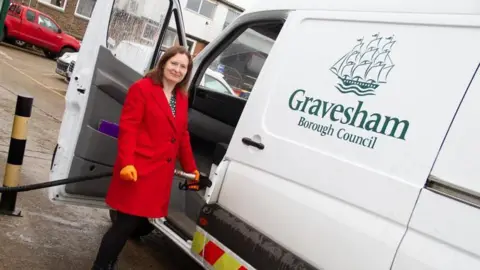Waste bin lorries to be powered by vegetable oil
 Gravesham Borough Council
Gravesham Borough CouncilA Kent council's entire fleet of vehicles, including its household waste collection HGVs, is to be converted to run on low-emission renewable fuel.
Gravesham Borough Council's fleet is made up of 134 vans, of which 18 are already electric vehicles, and 24 HGVs.
The HGVs consume about 320,000 litres of diesel per year, which makes up 22.4% of the authority's greenhouse gas emissions.
The council said the cost of electrifying the remainder of the fleet would be an unaffordable £12m, so the majority will soon be powered by hydrotreated vegetable oil (HVO).
HVO is a biofuel made from processed vegetable oil and is already used by major hauliers including DHL and Royal Mail.
Emma Morley, cabinet member for operational services, said the council would also have had to make considerable investment in its depot in Northfleet to increase its power supply if it had chosen to electrify the entire fleet.
"That's clearly not an option," she said.
"The beauty of HVO is converting to it is much simpler. It's a direct replacement for diesel and so there is no need to make any modifications to our vehicles, and we can use the fuel tanks already in place for storage."
The first delivery of HVO to the council's depot was made at the end of November.
The plan is for all non-electric vehicles to be running on the new fuel by April, the authority added.
Some electric vans will continue to be used.
Follow BBC Kent on Facebook, on X, and on Instagram. Send your story ideas to [email protected] or WhatsApp us on 08081 002250.
